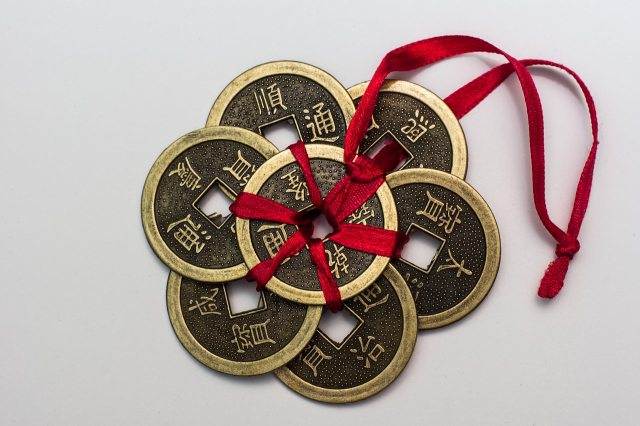Feng shui is a practice of looking at our living spaces and work environment and striking a balance with the natural world. The Chinese words "feng" and "shui" therefore translate to "wind" and "water", respectively. This concept derives from an ancient poem that talks about human life connected and flowing with the environment that surrounds it.
In Asian culture, this philosophy is called Tao, which means "the way." Taoism is the way of nature and all the basic principles of feng shui reflect nature. The essential principles of feng shui are: the position control, the bagua and the five elements.
The dominant position
Feng Shui guidelines suggest that you determine this dominant position in the room, then place the bed, your desk, or your stove in diagonal alignment. These three parts of your home are critical, as each one represents an essential part of your life. The bed is for you, the desk is an extension of your career and the stove represents your wealth and your diet.
The Bagua
A bagua is the feng shui energy map superimposed on your home plan. Each of the eight areas relates to a different life circumstance, such as family, wealth, or career. And each of these areas has corresponding shapes, colors, seasons, numbers, and earthly elements. At the center of the bagua, a ninth area, is you, which represents your general health and well-being.
The Bagua areas
The easiest way to incorporate the bagua into your life is to identify one or three areas that need more attention. Don't try to work in all areas at once. To strengthen your energy or improve flow in those areas, incorporate feng shui suggestions in that particular area. For example, to promote fertility, you can add a metal circular table in the part of your house that represents children.
Family (Zhen)
- Representing: Family, New Beginnings
- Shape: column, rectangular
- Colors: green, blue, teal
- Season: spring
- Number 4
- Item: Yang wood
Wealth (Xun)
- Representing: wealth, abundance, prosperity
- Shape: column, rectangular
- Colors: purple
- Season: spring
- Number 5
- Element: Yin wood
Health (Tai Qi)
- Representing: health, general well-being, the center
- Shape: flat, square
- Colors: brown, orange, yellow.
- Season: transitions between seasons
- Number 5
- Earth element
Helpful People (Qian)
- Representing: helpful people, benefactors, travel
- Shape: circular, spherical
- Colors: gray, metallic.
- Season: Fall
- Number 6
- Element: Yang metal
Children (dui)
- Representing: children, completion, joy
- Shape: circular, spherical
- Colors: white, metallic.
- Season: Fall
- Number 7
- Element: Yin metal
Knowledge (Gen)
- Representing: knowledge, self-cultivation, skill
- Shape: flat, square
- Colors: dark blue
- Season: transitions between seasons
- Number 8
- Element: Yang Earth
Fame (Li)
- Representing: fame, reputation, passion, visibility
- Shape: triangle, pointed
- Colors: red
- Summer season
- Number 9
- Fire element
Stroke (Kan)
- Representing: Career, path in life
- Shape: wavy, curvy
- Colors: black
- Winter season
- Number 1
- Water element
Associations (Kun)
- Representative: associations, marriage, self-care
- Shape: flat, square
- Colors: pink
- Season: transitions between seasons
- Number 2
- Element: Yin Earth
The five elements
The five elements (earth, metal, water, wood and fire) come from the Taoist tradition. The elements are five interrelated phases in life that work together to create a complete system. Feng shui practice works to balance these five facets in your home and each of your living areas or a bagua.
To incorporate the elements into your life and home, you need to define where you want to focus your energy. Like the bagua, you choose one or three areas of your life that you want to improve. Then strengthen your energy and the energy of your home by adding the suggested colors or shapes in that room.
Land
It symbolizes stability and balance. Therefore, it helps to grind and stabilize. That is, it brings the earth element inside with rocks, crystals and images of landscapes.
- Qualities: Earth, self-care, stable
- Shape: flat, square
- Colors: brown, orange, yellow.
- Season of the year: transitions between seasons
- Areas: health, knowledge, associations
Metal
It symbolizes logic and intelligence. That is, it is compatible with knowledge and mental acuity. Add this element to your space with metal frames or sculptures.
- Qualities: efficient, precise, beauty
- Shape: circular, spherical
- Colors: white, metallic.
- Season of the year: fall
- Areas: helpful people, children
Water
It symbolizes wisdom and serenity. therefore, it helps with clarity and relaxation. For example, mirrors, reflective surfaces, and aquariums are ways to add the water element to your space.
- Qualities: downward, flowing, changing
- Shape: wavy, curvy
- Colors: black
- Season of the year: winter
- Area: Career
Wood
It symbolizes growth and vitality. Therefore, placing wooden objects in your space encourages personal growth. That is, plants and wooden furniture are easy ways to add this element.
- Qualities: expansive, vitality, upward
- Shape: column, rectangular
- Colors: green, blue
- Season of the year: spring
- Areas: family, wealth
Fire
It symbolizes passion and energy. It is representative of transformation, expansion and volatility. Use candles and red objects to enhance your space with fire.
- Qualities: Passionate, illuminating, brilliant.
- Shape: triangle, pointed
- Colors: red
- Season of the year: summer
- Area: Fame






